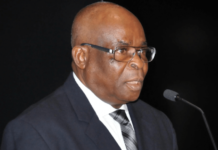 |
| Femi Mimiko, mni |
The Nigerian National Assembly lost a huge opportunity to be an agency for change when it bungled the on-going constitution amendment project.

A definitive move on the part of the body in the direction of some form of devolution of power, and resources, away from the centre, would have just been good enough to stave off the impending crisis attendant upon the growing acrimony on restructuring.
Alas, the National Assembly not only failed to do this, it ended up further consolidating the position of an already overbearing central government, which like a barracuda is already dying under its own weight. It purportedly scrapped State electoral commissions, and mandated INEC to conduct Local Government elections in all of 774 LGAs – institutions, which in a functional federal system are adjuncts of the State! It rooted for what is called local government autonomy – that very antithesis of federalism.
Sadly, the National Assembly left issues of high consequence and displayed more interest in relatively mundane issues like changing the name of the Nigeria Police Force to Nigeria Police, and moving superintendence of national parks from the central to State governments!
In all, what the National Assembly has done is akin to the proverbial Emperor Nero, who so much lacked the presence of mind to be fiddling while his Rome was on fire.
The fundamental issue here is that we must compel a restructuring of this so-called federation, so-called because it is a federation only in name. Two documents from which we cannot successfully run away in this regard are the 1963 Constitution that was forcefully overthrown in 1966 by the military; and the 2014 Confab report. The latter, in all practicality, is an update of the former. Those who decry the non-elective character of the Confab and thereby disparage its far-reaching recommendations forget that the 1999 Constitution they are wont to defend, is also not a product of any elected assembly. When eventually we persuade ourselves, or are compelled to stanch extant degeneration into complete political paralysis attendant upon the growing frustration with the prevailing structure, we would realize the profoundly regenerative possibilities of the 2014 document.
The concern is that it gets to a stage in the life of nations when some epochal acts consequential for national rebirth become too late. It is already very late now for our country. The fear is that as we deter on the needful, and expend useful time on frivolities, good reason would lose value, the appeal of extreme ideas would appreciate exponentially, and people who canvass them would seem like messiahs. That is what is called the triumph of extremism.
I dare say for the umpteenth time that the prevailing structure of governance makes development impossible in Nigeria. Governments at all levels, no matter how determined and well-meaning they are, can only do so much vis a vis development. The prevailing governance structure is only capable of reproducing crises, instability, corruption, and underdevelopment. How gladsome it would have been if the National Assembly had been alive to these issues, and demonstrated the requisite courage to move our country away from the precipice.
Femi Mimiko, mni is a Professor of Political Science at the Obafemi Awolowo University, Ile-Ife.










